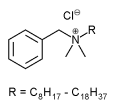Benzalkonium chloride
Benzalkonium Chloride is an organic compound that is used as an antiseptic and spermicide. This product is a nitrogenous cationic surface-acting agent belonging to the quaternary ammonium group. Benzalkonium chloride is a mixture of alkylbenzyl dimethylammonium chlorides of various alkyl chain lengths. The greatest bactericidal activity is associated with the C12-C14 alkyl derivatives. more...
It is one of the safest synthetic biocides known, and has a long history of efficacious use. Applications are extremely wide ranging, from disinfectant formulations to microbial corrosion inhibition in the oilfield sector. It is deemed safe for human use, and is widely used in eyewashes, hand and face washes, mouthwashes, spermicidal creams, and in various other cleaners, sanitizers, and disinfectants.
Benzalkonium chloride is readily soluble in water, alcohol, and acetone. Formulation requires great care as Benzalkonium can be inactivated by certain organic compounds, including soap, and must not be mixed with anionic surfactants. Hard water salts can also reduce biocidal activity. Although newer formulations are more resistant to deactivation, as with any disinfectant, it is recommended that surfaces are rinsed well before disinfection.
Aqueous solutions of benzalkonium chloride are neutral to slightly alkaline, colorless, and nonstaining. Solutions foam profusely when shaken, have a bitter taste, and a faint almond-like odour, which is only detectable in concentrated solutions.
The mechanism of bactericidal/microbicidal action is thought to be due to disruption of intermolecular interactions. This can cause dissociation of cellular membrane bilayers, which compromises cellular permeability controls and induces leakage of cellular contents. Other biomolecular complexes within the bacterial cell can also undergo dissociation. Enzymes, which finely control a plethora of respiratory and metabolic cellular activities, are particularly susceptible to deactivation. Critical intermolecular interactions and tertiary structures in such highly specific biochemical systems can be readily disrupted by cationic surfactants.
Benzalkonium chloride solutions are rapidly acting anti-infective agents with a moderately long duration of action. They are active against bacteria and some viruses, fungi, and protozoa. Bacterial spores are considered to be resistant. Solutions are bacteriostatic or bactericidal according to their concentration. Gram-positive bacteria are generally more susceptible than gram-negative. Activity is not greatly affected by pH, but increases substantially at higher temperatures and prolonged exposure times.
Read more at Wikipedia.org



